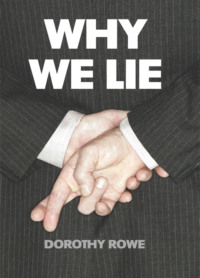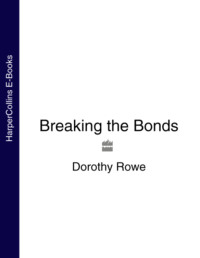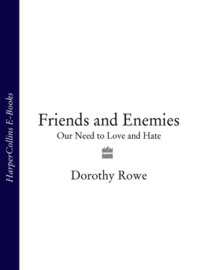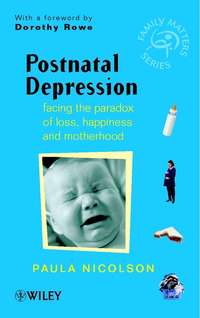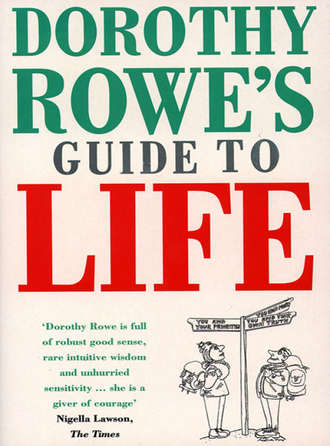
Полная версия
Dorothy Rowe’s Guide to Life
However, our favourite ways of creating our interpretations can result in interpretations which are far from reality.
For instance, we all know that envelopes come in many sizes and colours. Some people, however, when inspecting their mail, see and open white and coloured envelopes but never see, much less open brown envelopes. Yet unpaid bills don’t disappear into thin air.
We need to be aware how one group of our wishes can dominate all our interpretations. We can choose to see only what we wish to see and thus do only what we wish to do. However, our wishes might not be an accurate reflection of reality, particularly that part of reality which is composed of other people’s interpretations. We forget that other people see things differently from us.
You must have noticed that no two people ever interpret an event in exactly the same way. You interpret a television programme as being excellent. Your friend thinks it’s rubbish. This is not a matter of other people being mad, bad or awkward. It is an inescapable part of the way we are physically constituted.
Each of us, every moment of our lives, asleep or awake, is engaged in interpreting what is happening.
Each of us has only one source we can draw on in creating our interpretations.
This is our past experience.
No two people ever have the same past experience.
Identical twins might begin life with the same genetic components, but life in the womb differs for each of them, one is born after the other and from the moment they are born they have different experiences.
To the extent that two people create similar interpretations they can communicate, but even when two people speak the same language they create very different interpretations. Thus two people can live side by side, speak the same language, yet each interpret the world in totally different ways. It’s often said, for instance, that men and women inhabit different planets!
So here we are, each of us in our own little world of interpretations, yet, at the same time, we are born social animals.
We are physically constituted as social animals.
When you were born you didn’t just search around for a food-bearing nipple. You also searched for a friendly face. You were born knowing how to recognize a face and preferring to look at a face than at anything else.
If a friendly face hadn’t turned up for you to talk to, you wouldn’t be reading this now. Without a friendly face, even if you’d been adequately fed and kept warm, you would have either died in the first few weeks (it’s a condition known as ‘anaclitic depression’) or you would have gone on to become one of those strange individuals who are unable to see other people as being in any way different from other objects.
Out of the bond we develop with a mothering person in our own first months of life grows our sense of right and wrong, guilt and reparation. Babies who don’t get the chance to develop this bond grow up to be conscienceless people. They might lead apparently quite ordinary lives, whether criminals or company directors, but their personal relationships are always a disaster.
A PARADOX OF LIFE
We are each a unique individual living in our own individual, self-created world, yet we need one another in order to survive.
The interpretations we create don’t just exist on their own. They arise out of the set of interpretations we have created in the past and they also determine how we think, feel and act.
Whatever we think, feel and do has endless consequences.
This is another aspect of life which we cannot change.
It has to do with the nature of reality.
Whatever reality is, it does seem that it is a vast, ever-changing interconnectedness. Everything is constantly moving and everything is connected to everything else. Physicists say this, and so did the ancient Hindu, Taoist and Buddhist philosophers.
Because everything is connected to everything else,
All our acts have consequences.
Don’t kid yourself that what you do will have no consequences, or very limited consequences, or that you can decide what the consequences will be. A father might say, ‘I caught my son stealing. I gave him a good hiding and that was the end of it’, but he is deluding himself. The father’s actions will have consequences beyond the father’s control as a result of how the son interprets what his father has done.
Everything you do has consequences and these consequences spread in all directions and go on forever.
A PARADOX OF LIFE
Everything that happens has good consequences and bad consequences.
For instance, you win the lottery.
Good consequences: You give up working and plan a round-the-world luxury voyage.
Bad consequences: Your entire family comes too.
Remember that ‘good’ and ‘bad’ are not Absolute and Eternal Judgements existing outside our human life. We each have our own interpretation of good and bad. Some people believe that lotteries are wicked. Some people wouldn’t want to go anywhere without their family.
A PARADOX OF LIFE
Every interpretation we can create has good and bad implications.
Suppose your interpretation of the right way to behave includes the belief that you will always tell the truth.
The good implication of this is that people always know where they are with you, and the bad implication is that people are sometimes hurt by what you say.
Because every interpretation has good implications and bad implications, and every action has good consequences and bad consequences, life can never be perfect.
The longing for perfection is the longing for an illusion.
If you want to be miserable, believe that you and the world ought to be perfect.
You will always feel guilty, angry and disappointed.
If you want to be miserable, don’t try to make your interpretations as close to reality as possible.
You will always feel surprised, confused and fearful.
If you want to be miserable, believe that you, your life and the world are reality, fixtures which you cannot change.
You will always feel trapped and hopeless.
If you are miserable and want to change, say to yourself,
The way I interpret myself, my life and my world has implications and consequences which make me miserable.
What alternative interpretations can I discover for what has happened, is happening and will happen to me?
Which of these interpretations will give me the most satisfaction and happiness?’
Let’s look at the important components of ‘myself’, ‘my life’ and my world’.
CHAPTER 3 You and Your Own Truth
IF I WERE to ask you, ‘What kind of a person are you?’ and you were to answer truthfully, would you say,
‘Other people looking at me think that I’m a very together person, that I’m competent and confident, get on well with other people, always cheerful, kind – but they don’t know the real me. Underneath I’m very different. I’m not as confident and competent as I make out, and I’m not a nice person at all. I try not to let people know me as I am.’
If I asked you, ‘If you were a house, how would you describe yourself?’ would you say,
‘As a house I’ve got lots of rooms that represent different parts of me. On the outside the house looks all right – could be better but it will pass. There’s a front door that’s always closed. I’ll let a few people into the front rooms. They’re cheerful, nicely furnished rooms, good for work and socializing. There’s a room behind the front rooms where I let only one or two people in. It’s a rather sombre room. That’s where I am when I’m not with people. Beneath that room there’s a cellar. I keep the door to the cellar locked. There’s something terrible in that cellar. If people knew about what’s at the centre of my house that would be the end of me.’
Most people experience their existence as being something like this house.
Some people try to pretend that their cellar and its terrible contents don’t exist. This pretence leaves them feeling that they don’t have a whole house, just a facade of a house. They feel that they aren’t a person, just a facade of a person. They spend their time in their front room socializing and being good and kind to people. They need to be busy and have lots of excitement to stop them being aware of the emptiness and darkness lurking inside themselves.
Other people are always aware of the danger in the cellar. They believe that the only way to keep the cellar locked and hidden is for them to be very good. If they’re a good son/daughter, wife/husband, father/mother, employer/employee, friend and citizen they can keep the evil danger inside them well locked away. This is a never-ending task and their vigilance must be constant.
Most people believe that they are, in essence, bad and unacceptable, but that if they keep this essence hidden, and if they work hard to be good, other people won’t discover how bad they are and they’ll be accepted, and even liked and laved.
Most people believe that this is how they are, and that this is fixed and unchangeable.
If this is what you believe, then you are mistaken.
When you were born you didn’t experience yourself as being bad and unacceptable. When you were born you/your house was open-plan and everyone was invited in. You didn’t know anything about cellars and dangerous, dark forces inside you. You were as you were, open, curious, trusting, wanting to love and be loved, to please and be pleased.
Then the people around you, the very ones you wanted to please so they would love you, began suggesting that there was something nasty inside you and that your open-plan house needed a cellar where this nastiness could be locked away. This nastiness had names. There was greed (‘Babies should be fed at regular intervals and not just when they want to be fed’), dirtiness (‘You’ve soiled yourself. You’re disgusting’), selfishness (‘Wait your turn’), aggression (‘You’re a wicked child to hit your sister’).
All the time you were interpreting what was happening to you.
(You developed the ability to create meaning while you were still in the womb. We begin creating interpretations long before we have a language in which to describe these interpretations. Our interpretations take the form of feelings, images and sounds. Studies of babies in the womb show that they prefer the sweet melodies of Mozart to the taut sharpness of Stravinsky. No doubt once born they can distinguish the sound of ‘Dearest darling’ from the sound of ‘You filthy pig’ even though they don’t know the meaning of the words.)
Like everyone else, the only way you could create your interpretations was to use your past experience. But you were a tiny child. You didn’t have much experience but you did try to create the very best interpretations that you possibly could. You interpreted events and drew conclusions from your interpretations.
You found the world to be a very confusing place. Fortunately your mother explained the world to you.
There you were, toddling along on unsteady feet and your mother said, ‘Be careful or you’ll fall and hurt yourself.’
You took no notice. Then you fell over and hurt yourself. You drew a conclusion from this. You thought, ‘My mum knows what’s what. She tells me the truth.’
Soon after you had another accident. Perhaps you wet yourself or knocked over a glass of milk. Your mother said, ‘You disgusting, wicked child. You’ll be the death of me’ (or words to that effect).
Using your past experience you interpreted what she said.
You had found out that your mother knows the world and tells the truth. (You had no idea that she’d quarrelled with your father and was taking her bad feelings out on you.)
For you the truth now is that you disgust your mother and you are so wicked that you will kill her with your wickedness.
This dangerous, disgusting wickedness is inside you.
And so your open-plan house acquires an inner room.
You know now that this inner room can get you into trouble.
And so it does.
You find yourself in a situation from which you cannot escape and in which an adult whom you rely on is inflicting pain on you.
Perhaps it’s your mother or father, who love you and only want ‘the best’ for you. They want you to be clean and toilet-trained. They want you to do as you’re told, to be a sweet, pleasant, good child, a credit to them as parents. So they punish you when you’re not.
Perhaps your parents have abandoned you. Perhaps they don’t want you, or perhaps they’re doing the best they can for you but have to earn a living. Perhaps they’re ill, or dead.
Perhaps an adult is beating you, or using you in strange and painful ways.
Whatever the situation, it is for you the extremes of pain and danger.
You interpret the situation as, ‘I am being punished by my bad parent.’
Then you remember that you depend on this bad parent and you feel even more frightened.
What can you do?
You can do what we all do when we are in a situation from which we cannot escape and which is causing us pain.
We can change how we interpret the situation.
This is what you do.
You remember that dark room in your self/house. You realize that it is your fault that you are suffering. Your interpretation of the situation now becomes, ‘I am bad and am being punished by my good parent.’
Now you are safe in the care of you good parent.
Now your house has a cellar that contains something dark and dangerous and which you must keep hidden.
Now you can never just be yourself.
Now you know you must be good. Soon you are an expert in being good.
Some unlucky children do more than just learn how to be good. Perhaps this happened to you. Perhaps instead of that extreme situation occurring just a few times in your early childhood it occurred again and again. The adult you relied on kept inflicting pain on you.
How could you keep telling yourself that this adult was good and you deserved this punishment?
By re-interpreting your interpretation.
You decide that, ‘I am bad and am being punished by my good parent, and when I grow up I shall punish bad people in the way I was punished.’
Now you have learnt how to be cruel. Now when you grow up you’ll be able to say, ‘I was beaten as a child and it never did me any harm.’ What you don’t realize is that the harm the beatings have done is to let you think that you haven’t suffered any harm.
The harm that you have suffered is that you no longer know what your own truth is.
You think that your dark cellar contains something wicked and dangerous. You don’t know that it contains nothing dangerous at all. What is hidden in there is something you came into the world knowing, something the adults around you have forbidden you to know: your own truth.
Once you know something you can’t unknow it. So, to survive you had to hide your knowledge. This is what you did.
When you were small you didn’t need me to explain to you that each of us has our own way of seeing things. You knew that. You were often surprised that other people didn’t see things in the same way as you. You’d say, ‘Oh yes’ to something, and your parents would say, ‘Oh no.’ But that was one of the things which you found interesting.
You knew that you saw things in your way. You had your own truth.
Then the adults took that knowledge away from you.
The first time that happened was perhaps something like this. You were just big and strong enough to take a loose lid off a jar. Inside was something white which oozed when you squeezed it. If you moved your hand it spread itself across the carpet in a very interesting way, and if you bounced your hand against the carpet bits of it flew off and formed a pretty pattern. You were busy being a scientist and an artist. This was exciting. This was marvellous.
Then your mother arrived.
You recognized that she did not see the situation in the same way as you did.
If you were lucky she reacted calmly. Perhaps she said, ‘I know you’re enjoying yourself and that you’re learning a lot, but I’d rather you did that with soapsuds instead of my expensive face cream. I have my way of seeing things and on this occasion my view is going to prevail. Let’s get you and the room cleaned up.’
Most of us weren’t that lucky. Most of us were left in no doubt that our mother saw the situation differently. What she did was to show us that our way of seeing the situation was utterly, utterly wrong while her way was right and that we were very bad.
Bringing up children isn’t easy. Children do have to be told that many of their interpretations are not a good reflection of the situation and thus likely to lead to danger. Many a child has thought that the red circle on top of the stove would be nice to touch. But parents have a choice of how to tell the child this isn’t so.
(1) Parents can concentrate on the child’s interpretation of the event and, arising out of this interpretation, what the child did.
For instance, a parent restraining a child from running across a busy road can say, ‘The cars are moving faster than you think. Wait until the road is clear.’
OR
(2) Parents can ignore how the child has interpreted an event and simply tell the child that he is silly, stupid, childish, wicked to do what he did.
They can say, ‘You wicked child. How many times have I told you not to run across the road!’
(1) draws the child’s attention to the interpretation he has created and suggests that he can create a better interpretation and thus act more effectively.
(2) tells the child that there is something intrinsically wrong with him.
However,
(1) requires the parent to think, be creative, be patient and to ignore those adults who are watching and thinking, even saying, ‘If that was my child I’d give him a good hiding.’
Whereas
(2) is quick and can be a self-satisfying expression of the parent’s anger arising from his or her anxiety about the child.
On the whole, parents are more expert in interpreting the world than are children. However, there is one part of the world where the child, not the parent, is the expert.
The child is the expert in knowing about his own thoughts and feelings. The child knows what these are. The parent can only guess.
This applies to all of us.
When I say, ‘We can never know reality directly,’ I mean the reality of what goes on around us. There is one aspect of reality we do know directly and that is our inner world of thoughts and feelings. In judging the world around us, however carefully, we can only make approximations; we can never enter and know another person’s inner world, but we always know directly and accurately what we think and feel and why. We know our own truth.
Unfortunately, most of us don’t know that we know. We had that knowledge taken away from us when we were children.
Some parents take our knowledge away accidentally out of exasperation. Imagine the kind of scene where the child is making those unpleasant sounds which Australians call ‘grizzling’. The child feels in need of a cuddle and something to eat. He says, ‘I’m hungry. I want a biscuit.’ His mother says, ‘You’re no; hungry. You’re tired. Go to bed.’
The child is confused. He thought his feelings meant he was hungry but his mother says this isn’t so. She implies that she knows his feelings better than he does.
Our own truth is always private. Other people cannot know our truth unless we choose to tell them.
Small children have to learn that this is so. Some parents lie to their children in order to make them obedient. They say to the child, ‘I know what you’re thinking.’
Sometimes the parent is right about what the child is thinking. It’s an educated guess, not direct knowledge, but the child doesn’t know that her parent is making a guess from an assessment of the situation and the expression on the child’s face. The child thinks that the parent can read her mind.
I’ve met many adults who still have the feeling that their parents can read their minds. They dare not think, much less say, anything critical about their parents in case the parent, however far distant, knows what they are thinking and punishes them by making them feel guilty. ‘How could you think that, after all I’ve done for you.’
I’ve come across many people who, seeing psychologists as parental figures, believe that psychologists can see their deepest secrets. I’ve seen a banker turn pale when I’ve asked him if I could ask him a few questions about banks and money, while dozens of people, in the course of a casual conversation, have nervously asked me, ‘Are you psychoanalysing me?’, that is, ‘Are you seeing into the deepest recesses of my being?’
Some parents tell their children that God knows what they are thinking.
If God made us, He equipped us puny creatures with aggression to help us to survive in a hostile world, and with imagination to let us express our aggression towards one another in thoughts rather than in deeds.
When we are children, we become aggressive because parents necessarily frustrate us. Frustration leads to aggression. Children soon discover that they can vent their aggression in fantasy, allowing them to both murder (in fantasy) and preserve (in reality) their parents.
But if God can read your thoughts, and if anger and aggression are wicked, your own truth ceases to be your own certainty and becomes instead a source of shame, guilt and confusion.
It’s no wonder that some people come to feel that their thoughts are known to powers outside themselves and that these powers insert thoughts into their minds.
Some parents know that it is important to recognize and respect their child’s own truth. However, knowing your own truth and hanging on to it no matter what is not without its problems. My friends Galen and Helen have brought up their daughter Naomi to know her own truth. Naomi has always been allowed to say what she thinks. Now she is a beautiful sixteen-year-old. Recently Galen said to me, ‘She’s utterly fearless. I’m afraid for her.’ People alienated from their own truth often envy those who aren’t and will seek to do them harm. Naomi said, ‘Why should I be afraid of people? They’re just people.’
Surviving as a person knowing your own truth is a matter of deciding in an imperfect world which imperfections are the easiest with which to live.
Some children manage to hang on to their own truth, or at least some part of it, because they are brought up by parents who are too lazy, or too busy, or too inconsistent to police the child’s every act. These parents might, however, on occasion mock or punish their children when they reveal their own truths. Their children soon learn to keep their thoughts to themselves.
What effect this has depends on how well the children think of themselves.
If they manage to hang on to some self-confidence they become revolutionaries, inventors or artists who can decide which of the imperfections of this imperfect world they will accept and which they will try to change. The revolutionaries might not lead a revolution except in their own lives. They are critical of society and fail to conform. The inventors and artists preserve something of the child’s fresh vision of the world and out of this vision develop other possibilities.


